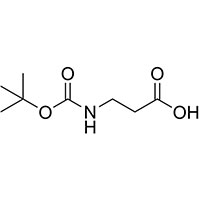Synonyms
N-(tert-Butyloxycarbonyl)-l-alanine
(2S)-2-({[(2-Methyl-2-propanyl)oxy]carbonyl}amino)propanoic acid
N-{[(2-Methyl-2-propanyl)oxy]carbonyl}alanine
N-(tert-Butoxycarbonyl)-L-alanine
EINECS 221-979-2
N-tert-butyloxycarbonyl-(S)-alanine
Boc-Beta-Ala-OH
3-(tert-Butoxycarbonylamino)-propanoic acid
Boc-β-Ala-OH
3-tert-Butoxycarbonylaminopropionic acid
3-[[(1,1-Dimethylethoxy)carbonyl]amino]-propanoic acid
l-Boc-alanine
N-[t-Butoxycarbonyl]-l-alanine
L-Alanine, N-[(1,1-dimethylethoxy)carbonyl]-
Boc-beta-alanine
Product Description
Introduction:
BOC-β-Alanine is a vital amino acid protecting agent widely used in peptide synthesis. With its
exceptional properties and compatibility with peptide assembly techniques, BOC-β-Alanine enables the
efficient synthesis of peptides containing β-alanine residues. Its high purity, reliability, and
versatility make it an indispensable tool for chemists and researchers involved in peptide synthesis
projects.
Product Features:
High Purity: BOC-β-Alanine is manufactured with meticulous attention to purity, ensuring minimal
impurities. Its superior quality guarantees the synthesis of peptides with excellent purity and
structural integrity.
Effective Protecting Group: BOC-β-Alanine serves as a reliable protecting group for the amino group of
β-alanine, preventing unwanted reactions during peptide chain elongation. It selectively shields the
amino group, allowing controlled incorporation of β-alanine into peptides.
Versatile Applications: BOC-β-Alanine finds extensive use in the synthesis of peptides with β-alanine
residues. Peptides containing β-alanine exhibit unique properties, such as altered charge, increased
hydrophobicity, and enhanced stability, making them valuable in drug discovery, peptide-based
therapeutics, and biochemical research.
Applications:
Peptide-Based Therapeutics: BOC-β-Alanine plays a crucial role in the synthesis of peptide-based
therapeutics. The incorporation of β-alanine residues can modulate the peptide's physicochemical
properties, such as solubility, membrane permeability, and enzymatic stability. Peptides containing
β-alanine have shown potential in various therapeutic areas, including antimicrobial peptides, antiviral
agents, and drug delivery systems.
Peptidomimetics: BOC-β-Alanine is widely used in the synthesis of peptidomimetics, which are
peptide-like compounds designed to mimic the structural and functional properties of natural peptides.
Peptidomimetics offer advantages such as improved stability, bioavailability, and target selectivity.
BOC-β-Alanine enables the incorporation of β-alanine residues into peptidomimetic scaffolds, enhancing
their therapeutic potential.
Neurobiology Research: BOC-β-Alanine is essential in neurobiology research, allowing the synthesis of
peptides involved in the study of neuropeptides, neurotransmitters, and ion channels. The incorporation
of β-alanine in these peptides can influence their folding, receptor-binding affinity, and biological
activity. Such peptides serve as valuable tools for investigating neuronal signaling pathways and
developing treatments for neurological disorders.
Market Outlook:
The demand for BOC-β-Alanine is steadily growing due to its significance in peptide synthesis and its
diverse applications in therapeutic development, peptidomimetics, and neurobiology research.
Pharmaceutical companies, academic institutions, and research laboratories rely on BOC-β-Alanine for the
synthesis of peptides with enhanced properties and unique functional characteristics. As the field of
peptide-based therapeutics and drug discovery expands, the market for amino acid protecting agents like
BOC-β-Alanine is expected to experience substantial growth.
Conclusion:
BOC-β-Alanine is a versatile and reliable amino acid protecting agent used in peptide synthesis. Its
high purity, effective protection of the amino group, and compatibility with various synthesis
techniques enable the incorporation of β-alanine residues into peptides, leading to enhanced properties
and diverse applications. The applications of BOC-β-Alanine in peptide-based therapeutics,
peptidomimetics, and neurobiology research underscore its importance as an essential tool for
researchers in the field.





